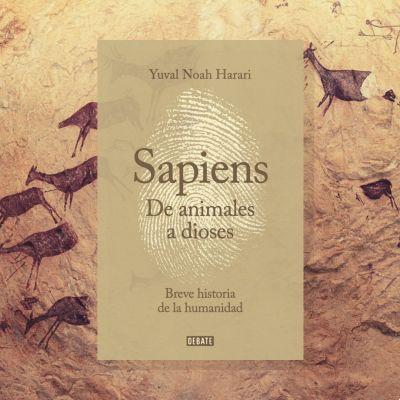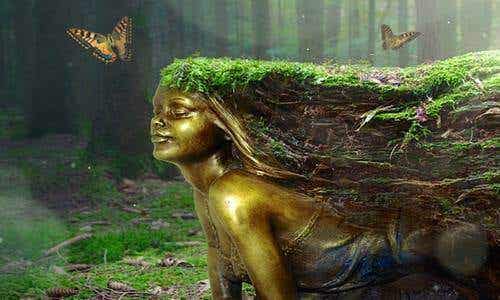
A few days ago I finished reading a very interesting book. It tells how humans transformed from animals to gods, developing the power to do what no other form of life has ever done: take over the entire world and evade the laws of natural selection.
In this article I have summarized and explained the most interesting/important concepts for you.
The transformation of animals to gods, explained in a book
The book “Sapiens. From animals to gods: a brief history of humanity” by Yuval Noah Harari is an essay that traces the history of the entire human race, analyzing what led our species from our ancestors to the dominant role we occupy in the world. current.
"History is something that few people have determined while everyone else was plowing fields and carrying buckets of water."
Yuval Noah HarariTry this little experiment: extend both arms to the sides of the body to form a horizontal line. Suppose that the distance from one end to the other represents the history of the Earth. What length do you think can represent human history?
If you're thinking about an arm, an elbow, or a hand, you're pretty much out of the way. Surprisingly, our time on Earth is so short that, depicted at arms length, it would only be visible under a microscope.
Although our existence on Earth has been relatively short, we have come a long way. What steps have led us to dominate the planet? According to Harari, these were the 3 fundamental steps:
- The ability to think allowed humans to develop language, which ultimately led to agricultural advances that allowed them to grow exponentially.
- The development of trade was made possible by the invention of money and writing.
- With better economic and communication means, the scientific progress that has taken us to where we are today has become possible.
Are you ready for an exciting crash course in the history of mankind? Let's start!
Exponential growth
"The exponential growth of the population began with the progress of agriculture, progress made possible by the ability to think and communicate."
Homo Sapiens certainly had some advantage that allowed it to outperform other human species on Earth. The most important differences lie in the brain. The turning point occurred about 70.000 years ago with the Cognitive Revolution, a time marked by the rapid mental evolution of Homo Sapiens and the overcoming of its predecessors.
With their evolved brains, Homo Sapiens surpassed all other human species. They formed communities, developed better hunting tools, and built simple trade networks to make life and survival easier.
The population grew hand in hand with the ability to communicate. Language distinguished our species from others because it allowed information to flow more freely. This helped people share knowledge about predators and food with each other. Since human beings could cooperate as a society and in a flexible way, ideas spread and made new advances possible.
Not long after, the Agricultural Revolution gave humans another great advantage: by abandoning the old methods of hunting and gathering and acquiring agricultural techniques, the situation of ancient men improved even more. Although this new method was slow at first, it proved much more efficient than the old strategies and allowed the population to skyrocket demographically.
Things were going well, but there was a problem. Managing ever larger communities required humanity to make further progress to get to where we are today.
money and writing
"The invention of money and writing allowed men to trade more efficiently, paving the way for further expansion."
With agriculture, humans became more efficient in the use of their time and energy. This allowed the birth of new workers such as weavers and blacksmiths. These individuals might deal with farmers, exchanging their goods for food. Although this system was better than the previous one, it soon became inefficient.
Let us imagine that we are living in that time and we have chosen to be blacksmiths by profession. His variety of knives and swords is a good means of trading food, such as pork. It seems simple enough to do the swap. But what if the farmer in your town already has a knife? What if he doesn't have a pig to kill for you right now? He can promise you one, but how do you know that he will keep his promise to you?
It is immediate to see how writing and money could greatly improve the situation. With the ability to record your transactions with the farmer, you can be sure they keep their word. And if you don't have anything he needs, you can sell your knife for money and then use the money to buy food.
From this point on, advances for Homo Sapiens followed rapidly. Laws soon helped regulate everything to make life safer. With the ability to write, economies and governments grew. Society began to flourish and the next step was the development of science, the last step in the transmutation of men from animals to gods.
The technological explosion
"Our society is the result of the technological and scientific explosion that occurred after our ancestors were able to trade and communicate better."
Now that they had efficient methods to produce food, trade, and write, our ancestors began to think more. This led to the Scientific Revolution, in which many people began looking for ways to improve their lives. Experimentation and exploration became common practice, and great advances were made in astronomy, physics, and medicine, greatly improving people's lives.
Take the infant mortality rate as an example. We now take for granted the possibility of having children who do not die young, but this was not always the case. Before medical advancement, the premature death of two or three children was common even in the wealthiest families. Today the situation is much better and the infant mortality rate is less than 0,1%
The human being saw opportunities in the possibility of expanding globally. The governments that financed the explorers and scientists saw a great expansion of their empires. Christopher Columbus' voyage to America and James Cook's voyage to the South Pacific are just a few examples. The rapid growth in these areas after exploration laid the foundation for today's globalization.
Although we have lived through our times of war, the history of mankind has now reached a time of great peace and prosperity. Some may see the unification of humanity as homogeneous and boring, but the lack of wars in recent years has never been a precedent. And even if we find ourselves facing other modern problems in the meantime, we must thank our ancestors for their progress, as they have brought us to the comfortable place we are in now.
From Animals to Gods - Review
“Sapiens. From Animals to Gods: A Brief History of Mankind” is certainly an interesting read. I was so fascinated by this book that I literally devoured it in a few days. I believe that such a text cannot be missing from our library and that it should be read in compulsory schools. It was fascinating to become aware of the advances that brought early man to today's technologically advanced society. But this book does much more than tell the story of humanity: it develops an exciting adventure that illustrates how man, through his superstructures, first conditioned his own species and then the entire ecosystem. The reader then finds himself maturing reflections that go beyond the story, coming to ask uncomfortable questions about himself and the society in which he lives.
If you too want to read this book, you can buy it at well-stocked bookstores or online at Amazon (where I also bought it):
See Amazon
In addition, in order not to miss other summaries and articles of interest, you can subscribe to the Fervida Ispiración newsletter:
Go to Newsletter
They may be interested in:
- Why are cats afraid of cucumbers?
- Movies based on true stories: the 25 must-sees
- You were not made to live like brutes, but to follow virtue and knowledge.
- Why does the hiccup come? Reasons and remedies
- The forgotten genius of Laura Bassi, the first great scientist in history
- Why is a book always a great gift? 10 reasons


























